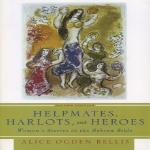April 13, 2011
Men in the Bible - like Abraham, Moses, King David - are often well-developed characters playing a central role in complex stories. But, more and more authors are focusing on the women of the Bible - developing their characters and giving them a stronger voice.
The Bible, says historian Alice Bellis, is a product of its time. "Of course it was written over several thousand years so different parts of it reflect different cultural norms at the time that that part was written. But certainly much of the Hebrew Bible was written during the period in which the men had the upper hand."
 Jezebel gets a more sympathetic portrayal in author Martha Shelley's 'The Throne in the Heart of the Sea.'
Jezebel gets a more sympathetic portrayal in author Martha Shelley's 'The Throne in the Heart of the Sea.'
That - she says - meant men wrote the stories in the Bible and narrated them. But Bellis, a professor of Old Testament at Howard University's Divinity School, notes that over the past two decades, a new genre of historical fiction has emerged, in which women are the narrators of familiar Bible stories which are recounted from their point of view.
"I think it's a result of the women's movement and women being interested in the stories of women in the Bible and wanting to read between the lines because there are so many gaps in the text that can be filled in multiple ways and tell the stories in different ways."
Writers have re-imagined the stories of some of the most-admired women in the Bible - Sarah, Rachel, and Deborah - and some of the most reviled, including Jezebel.
"I looked at the story in the Bible and thought, 'That woman has been slandered.' I got the impression that she was a harlot, an evil woman and so on," says author Martha Shelley, who read Jezebel's story in the "Book of Kings." It tells how the Phoenician princess marries Ahab, king of northern Israel. She angers Elijah and other prophets of the Hebrew god by supporting the priests of her pagan god, Baal. After Ahab's death, her sons are driven from the throne, and Jezebel is murdered.
Fascinated by the drama, Shelley decided to discover the real woman behind the Biblical bad girl, who has come to be associated with false prophets and prostitutes. Her novel about Jezebel is called "The Throne in the Heart of the Sea."
 The Bible, says historian Alice Bellis, is a product of its time - during which men had the upper hand.
The Bible, says historian Alice Bellis, is a product of its time - during which men had the upper hand.
To bring to life the people and customs of the Middle East of nearly 3,000 years ago, Shelley had to steep herself in the region's complex history.
"Because it took place long ago, I had to go to Israel and to the West Bank and do what I could to research it," she says. "Then, there is a question of researching the cultural stuff. I read a lot about anthropology. I had to read books like "Mesopotamian Chemistry," another one called, "Olive Oil in the Holy Land" about how they processed olives. I wanted to know the technology."
But there was no way to know about Jezebel herself. That had to come from interpreting what her enemies had written about her - and from the author's imagination.
"She was actually very loyal to her husband and devoted to her own religion," says Shelley, who also believes Jezebel was smart, headstrong and let nothing stand in her way. In the novel, Shelley explores 10-year old Jezebel's feelings when an unexpected rival arrives in the form of a baby brother:
The old woman lifted the infant out of the cradle and began rubbing it with salt.
It was male. Jezebel felt betrayed. She'd never considered that her mother would present her with a rival. No, a sister would be a rival--a brother would simply assume entitlement. In one night the throne had been stripped from her.
"Well, sweetness, what do you think?"
Jezebel stretched the corners of her lips in the right direction. "Very handsome." Maybe I could poison him, the princess thought.
Historian Alice Bellis is not surprised that Jezebel and other Biblical woman are getting a second look. She thinks these modern re-tellings might be just as accurate as the ancient ones.
"It's pretty clear that all of the biblical narratives, which we think of as historical narratives, do not adhere to the same standards of historicity which we think of history in the 20th, 21st century," says Bellis. "That there's a looser understanding of history in the Biblical times than we have today. Some feminist scholars have looked at her story and said that her intense devotion to her god is very similar to Elijah's intense devotion to his god. And if we could step back and look at it from a more neutral perspective, we would see that - as modern Western people who value tolerance - we would not really like either one of these characters because both of them are out to kill the prophets of the other one. So, they are both cut from the same cloth. But the way the Biblical narrative depicts it, Elijah is wonderful and Jezebel is terrible."
Bellis says "The Throne in the Heart of the Sea" and novels like it are part of a long tradition of finding new meaning in ancient stories, bringing Biblical characters to life for modern audiences.